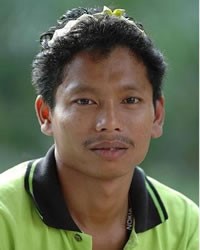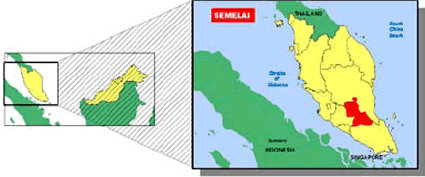The Semelai are one of the nineteen Orang Asli people groups of Peninsular Malaysia. They are part of the Aboriginal Malay (officially called Proto-Malay) subgroup.
Semelai is literally translated, "man of the land." Archaeological evidence has shown that the Semelai folk have been natives of the land for more than 600 years. They live in the states of Negeri Sembilan, Pahang, Selangor, Malacca, and Johor. Most of their villages sit along the wetlands surrounding Lake Bera in Southwest Pahang. Many new settlements have been opened along nearby riverbanks.
Prior to government-imposed oil palm and rubber estates, the Semelai were shifting agriculturalists who were also actively trading in minor forest products. They were basically wage-earners. For example, they were employed for clearing the forests to make way for the first rubber plantations in Negeri Sembilan. Today, many of the Semelai settlers have found a new occupation of introducing urban dwellers and other tourists to their way of life in the lake and wetland sanctuary of Lake Bera. This not only supports a diversity of animal and plant life, but also sustains the livelihood of the Semelai tribe. The Semelai have a vast knowledge of plants and their qualities. They are skilled at identifying animals from their tracks. They are well-versed in legends of their traditions, culture, and way of life. They were, and still are, very aquatic and agriculturally oriented. Apart from hunting and fishing, the Semelai also cultivate crops and collect jungle produce. They fish more than hunt. Semelai women are known for their skills in weaving mats. The Semelai, interestingly, have a rich tradition of oral histories, folklore, and mythology. Story telling has long been an important genre of expression in Semelai culture. Myths told at night are believed to describe events that occurred before one's remembered ancestors. Stories, told at any time, are believed to have occurred in the historical past.
Numerous taboos govern the lives of the Semelai who believe in the existence of ghosts and spiritual beings. For instance, the Semelai believe when people are asleep their souls travel to the places they dream about. As in other Orang Asli cultures, dreaming is an important means of divination in Semelai culture. Different kinds of people, spirits, or animals appearing in dreams have different cultural interpretations.
For example, if one dreams of a Chinese asking to marry a particular Semelai girl, that girl is in danger of deadly mishap. If made aware of the dream, she would probably not go out of the house the following day. Although a particular Chinese may be considered dangerous, it can also be good fortune to marry a Chinese man because he is likely to have more money than a Semelai man. She would also benefit from the Chinese social networks in towns.
The Semelai people are fortunate to find a safe haven in the wetland sanctuary of Lake Bera. However, they need to habituate to their new surroundings.
Ask the Creator to send workers to help them develop their surrounding environment. Pray for local believers to relate and respond to all the needs of these people.
Pray for the Lord to shower the Semelai with blessings as a testimony of his power and goodness.
Scripture Prayers for the Semelai in Malaysia.
Southeast Asia Link - SEALINK Copyrighted © Used with permission.
| Profile Source: Joshua Project |











